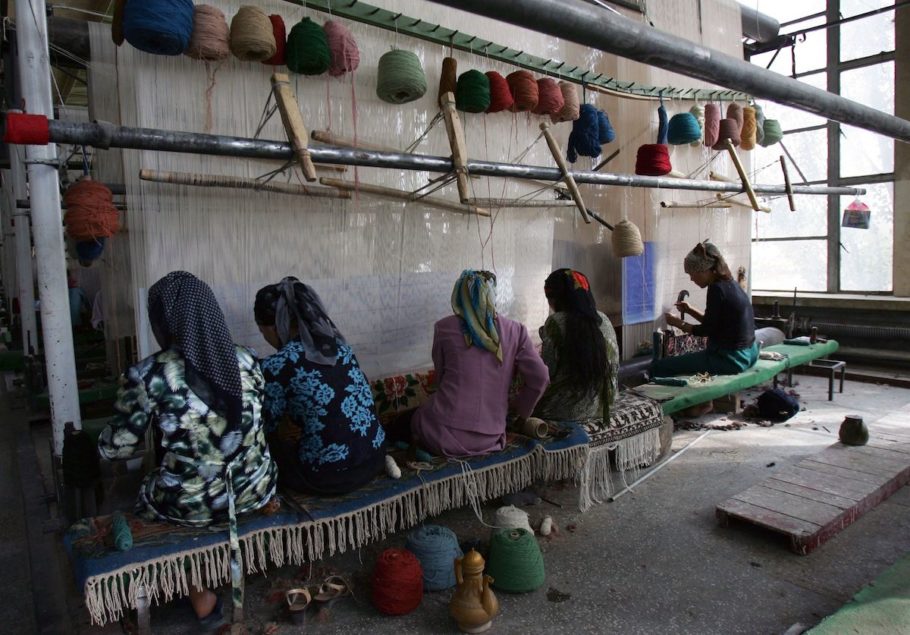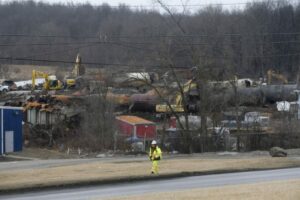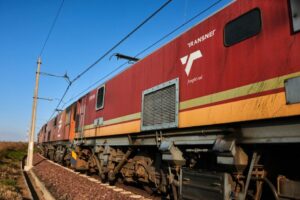
The U.S. expanded a ban on imports from China’s Xinjiang region, placing two more companies on its so-called entity list, the first additions since a law targeting forced labor in the area took effect in 2022.
Printing and imaging company Ninestar Corp. and eight of its subsidiaries, as well as Xinjiang Zhongtai Chemical Co. Ltd., were added to the list “for working with the government of Xinjiang to recruit, transport, transfer, harbor or receive forced labor” involving Uyghur and other ethnic minorities, the U.S. Department of Homeland Security said in a statement June 9.
That widens the list to 22 companies, including solar material manufacturers Xinjiang Daqo New Energy Co. and Hoshine Silicon Industry (Shanshan) Co., Ltd., as well as the state-affiliated Xinjiang Production and Construction Corps.
Read more: New Law Would Require Canadian Businesses to Provide Annual Reports on Forced Labor
“These enforcement actions send a clear message to the importing community,” Robert Silvers, the DHS undersecretary for strategy, policy and plans, said in an interview. “Companies must know their supply chain.”
The move is certain to anger China, just as the U.S. seeks to mend deteriorating ties. Secretary of State Antony Blinken is said to be planning an official trip to China in the coming weeks, possibly including a meeting with President Xi Jinping.
The Uyghur Forced Labor Prevention Act, which came into force June 2022, bars imported goods partly or wholly made in China’s Xinjiang region, unless companies can prove the products have no ties to forced labor.
More organizations may be added to the list, Silvers said. “There’s a pipeline of cases,” he said.
Congress passed the law unanimously with support from labor unions and activists. It seeks to put pressure on Beijing for allegedly detaining minorities in Xinjiang, an autonomous region in northwestern China that’s home to millions of Uyghurs.
Read more: How to Fight Forced Labor in the Supply Chain
Some $1.3 billion in shipments were subjected to special inspections since the summer of 2022 because of indications that they might be the product of forced labor, Silvers said.
No exemptions have been granted because no entity has been able to provide clear and convincing evidence that the goods are free of forced labor, he said.
China has been accused of incarcerating more than 1 million Uyghurs in recent years and forcing Muslim citizens into forced labor, including the harvesting of cotton. Beijing has repeatedly denied that it’s committing such human-rights abuses.
A 2022 report by the Helena Kennedy Centre for International Justice at Sheffield Hallam University in the U.K. mentioned state-owned Xinjiang Zhongtai, saying it had accepted more than 5,000 workers through state-sponsored transfers, more than any company the authors documented.
- SEO Powered Content & PR Distribution. Get Amplified Today.
- EVM Finance. Unified Interface for Decentralized Finance. Access Here.
- Quantum Media Group. IR/PR Amplified. Access Here.
- PlatoAiStream. Web3 Data Intelligence. Knowledge Amplified. Access Here.
- Source: https://www.supplychainbrain.com/articles/37435-us-expands-china-forced-labor-embargo-with-ban-on-two-new-firms
- :has
- :is
- 000
- 1
- 2022
- 22
- 9
- a
- Able
- abuses
- accepted
- accused
- Act
- actions
- activists
- added
- additions
- allegedly
- an
- and
- anger
- annual
- Antony Blinken
- any
- ARE
- AREA
- AS
- At
- authors
- autonomous
- Ban
- bars
- BE
- because
- been
- Beijing
- Billion
- businesses
- by
- came
- CAN
- Canadian
- cases
- centre
- certain
- chain
- chemical
- China
- Chinas
- Citizens
- clear
- CO
- coming
- coming weeks
- committing
- community
- Companies
- company
- construction
- Corp
- Department
- department of homeland security
- DHS
- documented
- effect
- Embargo
- energy
- enforcement
- entity
- evidence
- expanded
- expands
- fight
- firms
- First
- For
- Force
- Free
- from
- goods
- Government
- granted
- had
- Harvesting
- Have
- he
- Home
- homeland
- Homeland Security
- HTTPS
- Imaging
- importing
- imports
- in
- Including
- indications
- industry
- International
- Interview
- into
- involving
- IT
- ITS
- Jinping
- jpg
- june
- just
- Justice
- Know
- labor
- Law
- List
- Ltd
- made
- Manufacturers
- material
- May..
- meeting
- mentioned
- message
- might
- million
- millions
- minorities
- more
- move
- must
- New
- new firms
- no
- of
- official
- on
- or
- organizations
- Other
- passed
- pipeline
- placing
- planning
- plans
- plato
- Plato Data Intelligence
- PlatoData
- policy
- possibly
- president
- pressure
- Prevention
- Product
- Production
- Products
- Prove
- provide
- put
- receive
- recent
- recruit
- region
- REPEATEDLY
- report
- Reports
- require
- ROBERT
- s
- Said
- saying
- secretary
- security
- Seeks
- send
- Silicon
- since
- solar
- special
- State
- state-owned
- Statement
- Strategy
- such
- summer
- supply
- supply chain
- support
- targeting
- than
- that
- The
- The Area
- the Law
- their
- they
- Through
- Ties
- to
- took
- transfer
- transfers
- transport
- trip
- two
- U.K.
- u.s.
- U.S. Department of Homeland Security
- unanimously
- Unions
- university
- Weeks
- WELL
- were
- which
- wholly
- with
- workers
- working
- would
- xi
- xi jinping
- years
- zephyrnet












